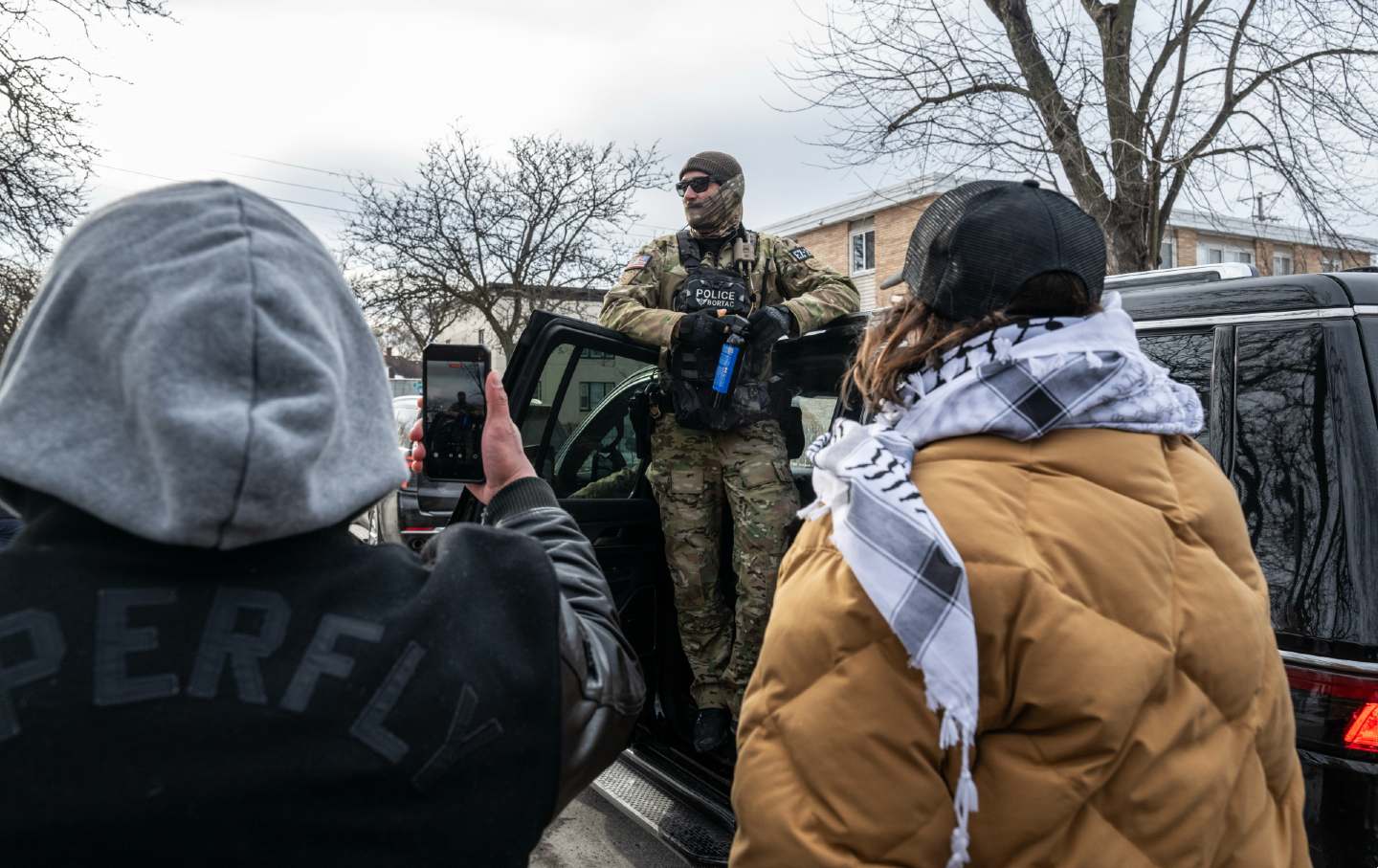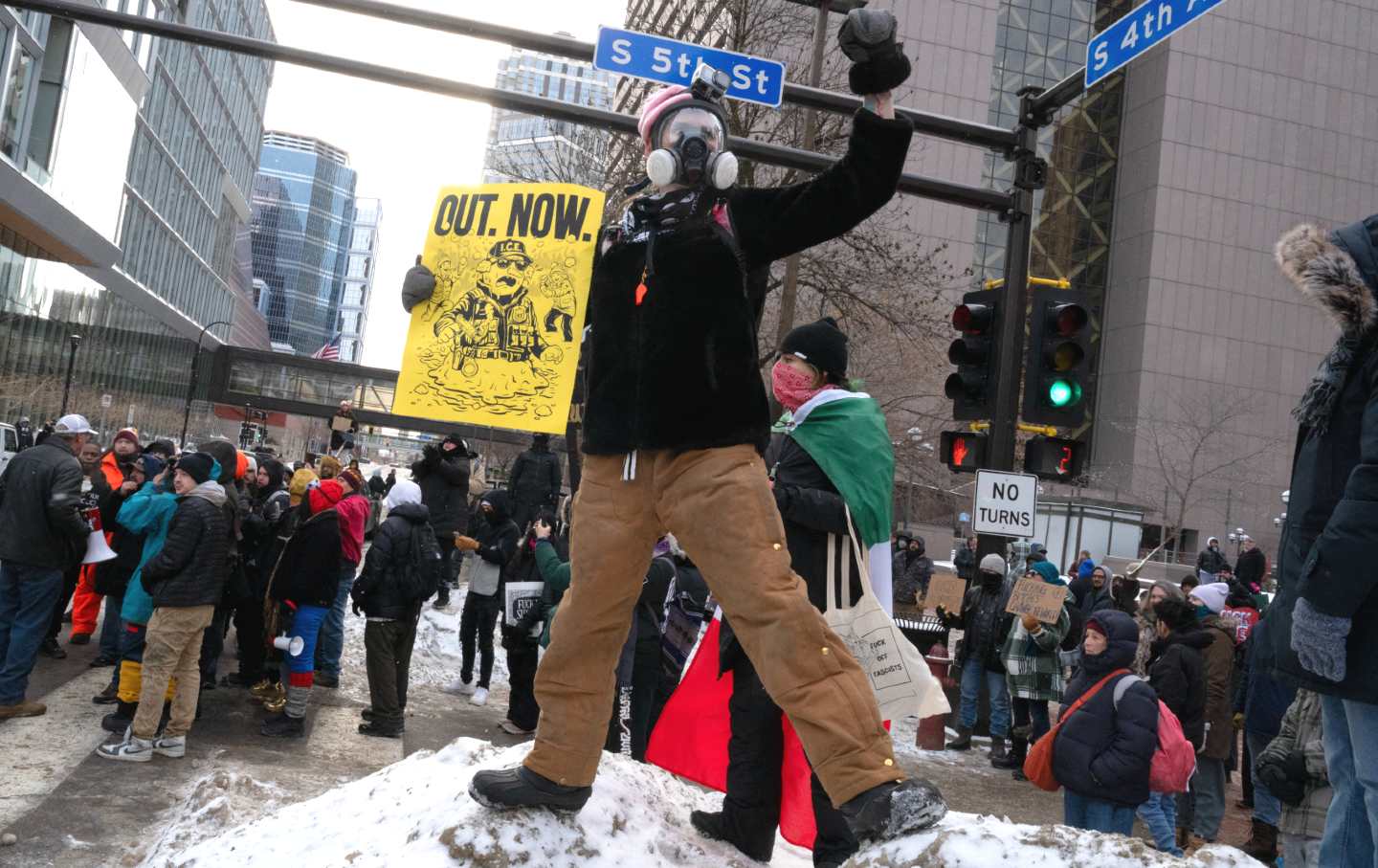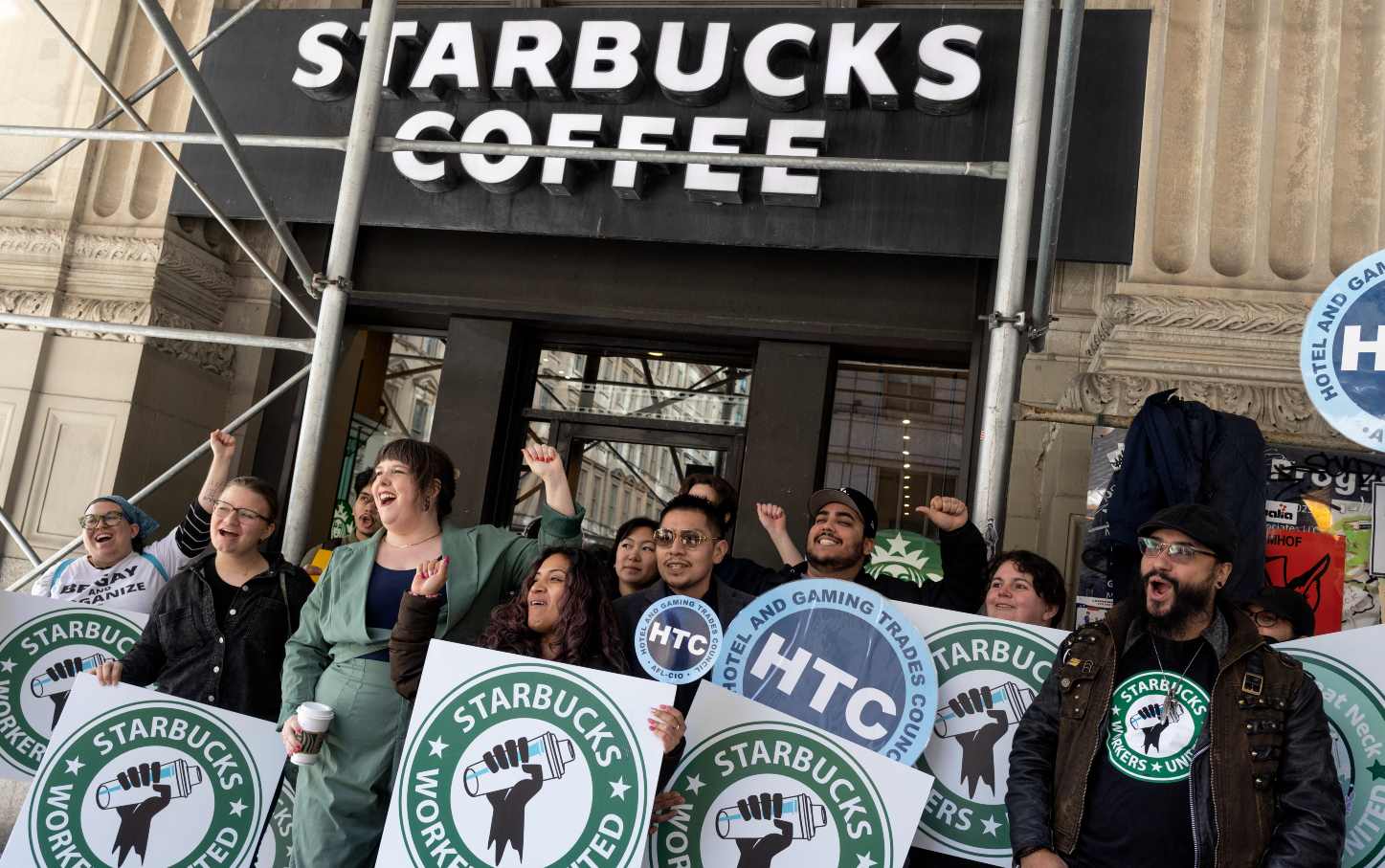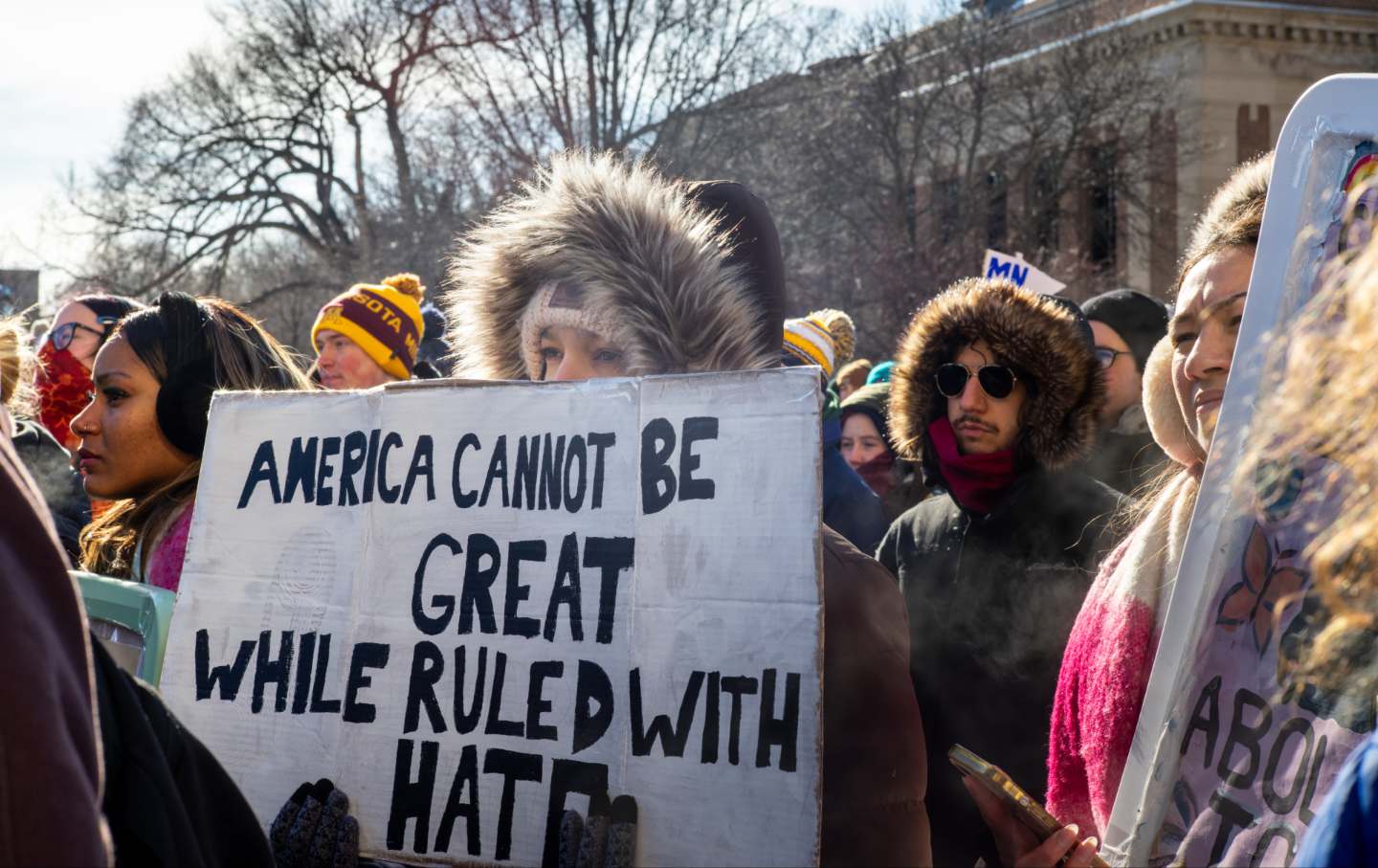The Exhausting Fight for Climate Action
The struggle against climate change has long been demoralizing and draining. But we need to gather our strength to meet this moment.
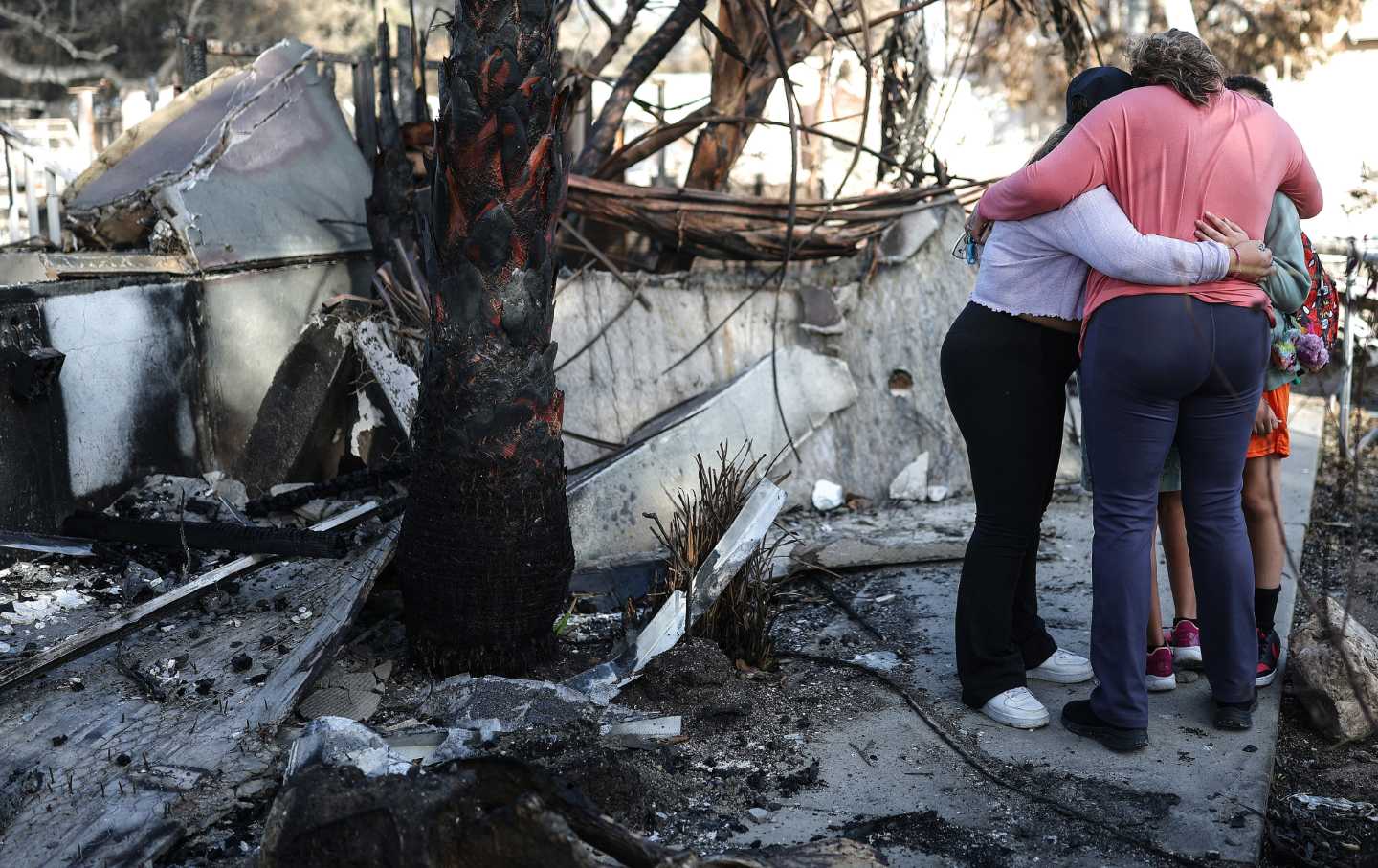
A family embraces in the aftermath of the Eaton Fire that claimed their home in Altadena, California.
(Mario Tama / Getty)
Roughly two weeks before a climate-change denier retook the Oval Office, wildfires made 35 percent more likely by climate change erupted across Los Angeles. Having destroyed over 16,000 homes and claimed nearly 30 lives, the fires are an awful harbinger of our rapidly warming world, which has already breached the so-called “safe limit” set by the Paris Agreement. I’m only 24 years old, and I’ve spent more of my life advocating for climate action than I can remember; it’s always felt like an uphill battle, but now it feels different. The Trump administration is a carbon bomb that will reverberate for generations—and more immediately, for my generation. Watching flames engulf entire communities while the new White House order commences, I am overcome with exhaustion. I’m tired of feeling outraged and grief-stricken watching my country’s leaders prop up an economy that, by its very design, mortgages my and my peers’ future for their short-term gain and works for none of us in the long run.
I can’t help but also feel angry at the Biden administration and the Democratic Party, who banked young people’s futures on having Biden or Harris in the Oval Office—promising us that if we got out and voted, just as we did in 2020, we’d see our efforts rewarded. President Biden resisted taking the kind of sweeping and bold action to protect our futures that Trump and his sycophants are now using to systematically destroy them. Instead of actually declaring an official climate emergency (as over 2,364 jurisdictions in 40 different countries, including 18 national governments and the European Union, have done), Biden simply said he had “practically” declared one. Meanwhile, Trump took a day to formally declare a national energy emergency to expedite oil and gas drilling, furthering dependence on the deadly fossil fuels and withdrawing (again) the world’s largest historical emitter from the Paris Agreement, with the industry-bought GOP continuing to fall in line with unabashed climate denial and delay. The list of environmental rampages goes on, including nominating a fossil fuel CEO for secretary of energy and a vaccine skeptic to lead the Health and Human Service Department amid rising cases of bird flu, one of many zoonotic and infectious diseases made more likely to spread by climate change.
Undoubtedly, these past four years, the climate movement made strides; thanks to the concerted efforts of countless climate advocates and dedicated officials under Biden, we successfully passed the historic, albeit imperfect, Inflation Reduction Act, established a White House Environmental Justice Advisory Council, and even secured a ban on new offshore drilling (which Trump has already sought to revoke). Hopefully, some progress will remain intact, like the boost to a burgeoning renewable energy sector, especially as other countries honor their climate commitments; other measures, like the Climate Corps, the new administration will simply annihilate with the stroke of a pen.
The system we’re living in not only discounts our futures; it infuses the present with anxiety. Young people everywhere are already losing everything from floods, fires, heat waves, and extreme weather events every day; typical life goals feel unattainable. We struggle to contemplate saving up to buy a home (will it be besieged by flames or get swallowed by a storm?), having long, fulfilling careers (what are we laboring toward on a burning planet?), or even having children (what quality of life would they have?). A 2021 study published in The Lancet Planetary Health found that 36 percent of Americans aged 16 to 25 years old are hesitant to have children because of climate change. We can’t even imagine growing old. Forget 2100—what will my life look like in 2050, with a foot of sea level rise submerging the US coastline? What will the lives of my friends in South Asia, where temperatures are projected to exceed the greatest extremes that humans can withstand, look like?
But it’s still not too late for climate action. The prospects for a more just and sustainable future may seem bleak, but we can’t give up. If we do, then we have not only sealed the fate of those most vulnerable and least responsible for this crisis, but we have also abdicated something fundamental: our shared humanity, and our responsibility to love and care for each other and for our planet. As harms magnify, the need to scale up equitable responses that put human life and dignity first become more essential than ever before.
That means we continue to organize, to advocate, to litigate, to protest, and to unify. We continue to get creative, to build community, to heal, and to make our movement the biggest tent—helping every person find their place in the climate justice movement because it’s their movement, too, no matter what ballot they cast last November. We demand a new and regenerative politics. We don’t let the petro-villains win.
So we keep fighting for the only scientifically and morally acceptable outcome: a rapid fossil fuel phase-out, starting now. We build on the progress we’ve made, continue scaling campaigns for change—from advocacy for a fossil fuel nonproliferation treaty to exposing fossil fuel propaganda and policy distortion, and demanding fossil fuel divestment—and stay vigilant, monitoring and responding to every attack on a livable future.
And we continue fighting an intersectional fight, understanding that climate justice is economic, social, racial, gender, and border justice. We continue advocating for policies that welcome environmental migrants and climate refugees from the Global South, suffering the consequences of Global North greed, and acknowledge that climate-change–induced displacement is already happening within our borders. From 2014 to 2024, weather-related disasters caused the equivalent of 60,000 displacements per day; by 2050, there could be up to 1.2 billion climate refugees. We need protections in place from the local to global levels.
Tomorrow, like most days, I’ll wake up again filled with rage and grief. But I’ll also wake up resolute because I truly believe that the moment we say the future is in their hands, it is—and every moment we reject that proposition, that we resist, the chasm of darkness gives way to a little more light.
Your support makes stories like this possible
From Minneapolis to Venezuela, from Gaza to Washington, DC, this is a time of staggering chaos, cruelty, and violence.
Unlike other publications that parrot the views of authoritarians, billionaires, and corporations, The Nation publishes stories that hold the powerful to account and center the communities too often denied a voice in the national media—stories like the one you’ve just read.
Each day, our journalism cuts through lies and distortions, contextualizes the developments reshaping politics around the globe, and advances progressive ideas that oxygenate our movements and instigate change in the halls of power.
This independent journalism is only possible with the support of our readers. If you want to see more urgent coverage like this, please donate to The Nation today.


